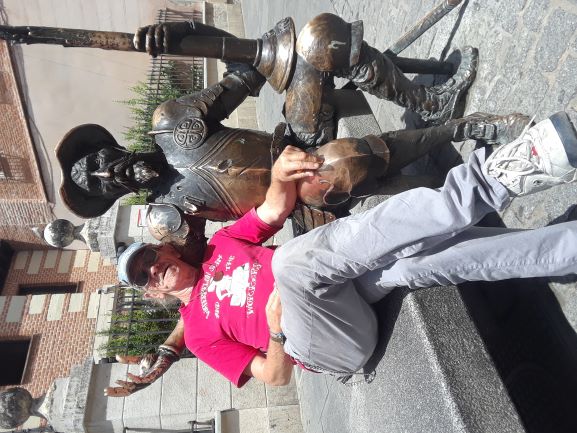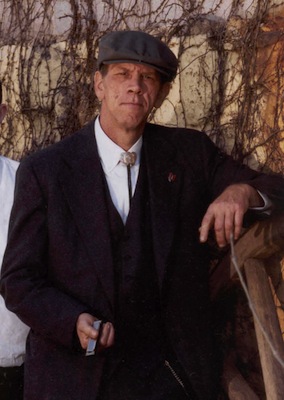
2019, Me and Don Quixote, downtown in Madrid. The life of an investigator can be quixotic.
(Image by self) Details DMCA
In 1986, I was finishing my B.A. in Journalism and History at the University of Oregon. One day an AP Bureau Chief from Portland, named Hugh Van Swearingen, visited the Journalism School to meet prospective young AP journalists. I was the oldest member of the J-School class of 1986, and thus considered myself not a supplicant just looking for work, but a peer of this man.
After the official business of the day, I invited the gentleman to come have a beer with me at my local tavern/blues joint. The conversation was mostly about foreign correspondence, and about under what conditions breaking news reported by an independent journalist (what we used to call a free-lancer) would be printed. Earlier in my Oregon career, I had taken a couple of graduate-level seminars in which one of the participants was a former major in the Rhodesian Army. This person offered me a chance to become an embedded journalist in South Africa, in which country apartheid was still the law.
I asked Mr. Van Swearingen whether, as a free-lance journalist, if I happened to be in a South African location into which insurgents invaded and killed everyone they saw, and I somehow survived, my reporting of the incident would be published. The Bureau Chief said that regardless of my journalism credentials it almost certainly would not, and that the AP would have to send an officially employed journalist to confirm all the facts I had reported.
Van Swearingen said he would not consider it so. I pointed out that according to our research, in the worst-case scenario, the water of a 200-year rain would breach the 3000-foot-deep unlined shafts, which as it was (and is today) required constant mine dewatering, and bring the nuclear waste to the surface. From there, the Pecos River would be contaminated, and from the Pecos, the radioactivity would reach the Red River in little more than 100 years.
He answered that first of all, the possibility of disaster in 100 years could hardly be considered as "breaking," and besides that, he himself (he was in his 50s) would not be around to witness that scenario. With this abdication of responsibility, our conversation came pretty much to an end. We finished our beers, I bade him farewell, and never saw him again.
One of my father's friends, going back before the writing of The Rise and Fall of the Third Reich, was William Shirer. In 1987, after I had received my degree, gone to Europe to try to establish myself as a professional musician, failed, and returned to take a trucking job, I was fortunate to have a substantial telephone conversation with the famous war correspondent. Shirer told me that I should probably forget it. He told me I should expect to spend 5 to 10 years as a local reporter for a local newspaper before even credibly applying to one of the major news outlets as a foreign correspondent.
I have now read not only The Rise and Fall (which I just finished re-reading an hour before writing this comment) but also Shirer's autobiographical account of his years embedded in Germany, then Nazi Germany, The Nightmare Years, 1930 to 1940. It was "a riveting first-hand account of the events and men who set the world on fire, (but) also the human story of a young American caught in these titanic events, struggling to survive and provide a normal life for himself, his wife and infant daughter."
In Nightmare Years I learned that Shirer was a super-polyglot, who learned several foreign languages fluently during his work in Europe. I speak one foreign language, and struggle with two others, but I have no confidence that I would ever have been able to be totally sure that the information I was receiving in several languages, synthesizing and making public was correct.
John Taylor, I will always remember the cynicism of AP Bureau Chief Van Swearingen. Looking back, I'm glad I remained a driver-laborer, until finally the right people heard my music and made sure I had the opportunity to have it heard internationally.
I do not utterly deny the cynicism in my own geopolitical analysis, but now, an old man, I am glad I never made journalism my career.





